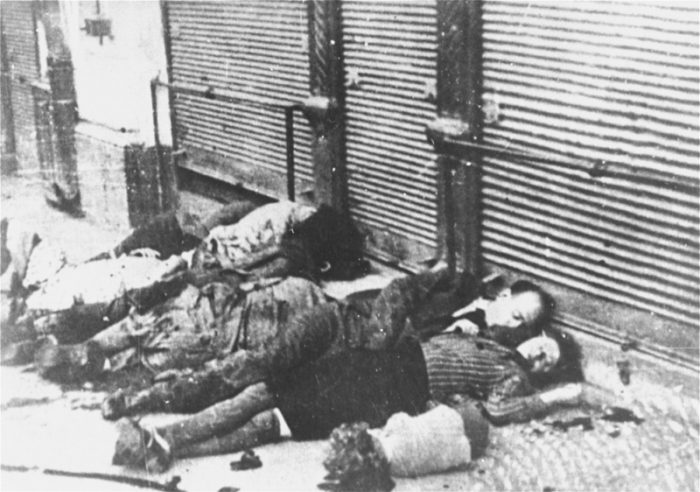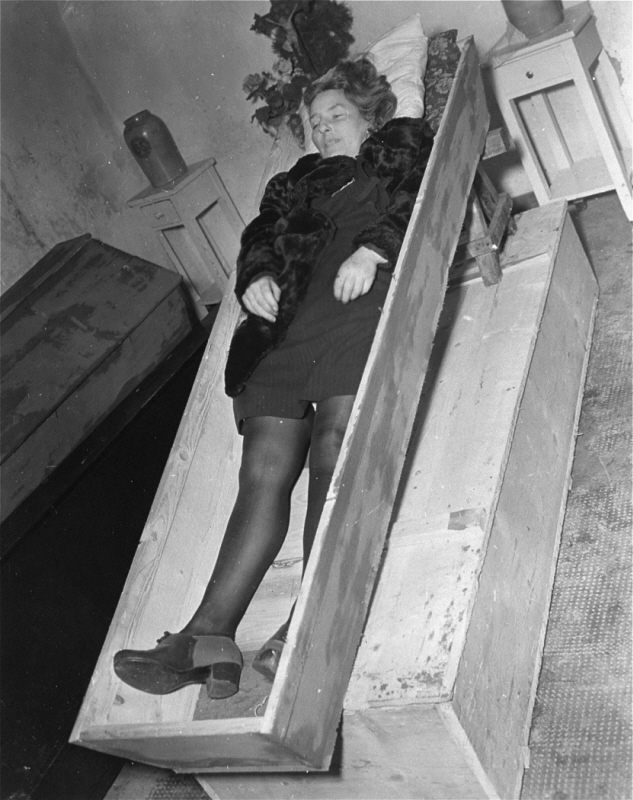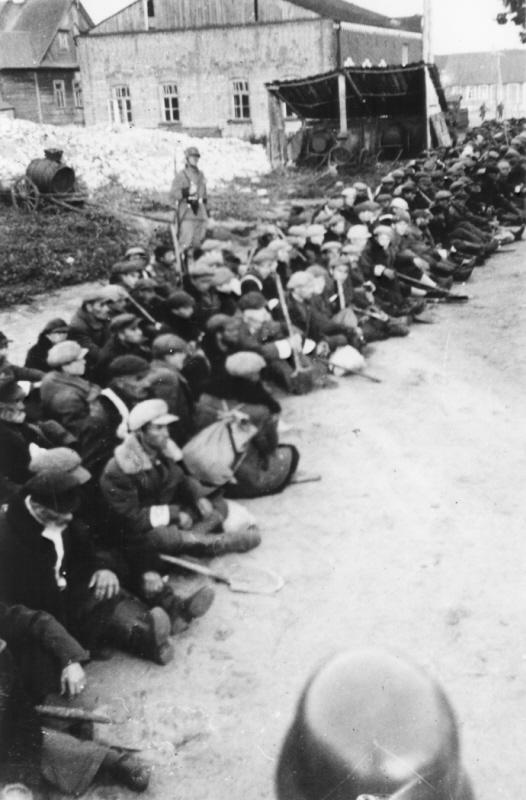The lights on the ramp flicker with a spectral glow, the wave of people – feverish, agitated stupefied people – flows on and on, endlessly. They think that now they will have to face a new life in the camp, and they prepare themselves emotionally for the hard struggle ahead. They do not know that in just a few moments they will die, that the gold, money, and diamonds which they have prudently hidden in their clothing and their bodies are now useless to them. Experienced professionals will probe into every recess of their flesh, will pull gold from under the tongue and the diamonds from the uterus and the colon. They will rip out gold teeth. In tightly sealed crates they will ship them to Berlin.
WE WERE IN AUSCHWITZ
By Siedlecki, Olszewski, Borowski
“The female nurse put the new baby in a water bucket and then burned it in the oven.” One woman managed to hide her baby for five months, but then it was discovered and she was ordered to turn it over for destruction. Kosciuszkowa reports that this mother “pressed her son to her heart and went to the crematorium together with him.”
PEOPLE IN AUSCHWITZ
By Hermann Langbein
When the number of those taken to the crematorium was so small that it would not have been cost-effective to fill a big gas chamber with Zyklon B, the victims were shot. A member of the Sonderkommando has described such a shooting, and his notes were unearthed at a later date: “A group of emaciated, starving Jews was brought in from some camp. They undressed in the courtyard and one by one went to be shot. They were terribly hungry and begged for a piece of bread to sustain them for the short time they still had to live. Inmates brought a large amount of bread. The eyes of the new arrivals, which had been dimmed by the horrendous hunger, blazed in a wild outburst of joy. With both hands they seized a piece of bread and devoured it greedily while they were climbing the stairs to be shot.”
PEOPLE IN AUSCHWITZ
By Hermann Langbein
Gerda Haas, a twenty-year-old nurse, remembers how heart-rending she found it when the Gestapo assigned her and other hospital nurses to collect Jewish orphans who had been lodged with various Jewish families throughout the city. Each was given four or five addresses and told to go with a team of Gestapo police officers, pick up the children, and have them at the collection point by 4:00 a.m. the next morning.
REFUGE IN HELL
By Daniel B. Silver

The bodies of a Jewish family killed in Romania. Note the small child.
Though the “Jew hunt” has received little attention, it was an important and statistically significant phase of the Final Solution. A not inconsiderable percentage of Jewish victims in the General Government lost their lives in this way. Statistics aside, the “Jew hunt” is a psychologically important key to the mentality of the perpetrators. Many of the German occupiers in Poland may have witnessed or participated in ghetto roundups on several occasions – in a lifetime, a few brief moments that could be easily repressed. But the “Jew hunt” was not a brief episode. It was a tenacious, remorseless, ongoing campaign in which the “hunters” tracked down and killed their “prey” in direct personal confrontation. It was not a passing phase but an existential condition of constant readiness and intention to kill every last Jew who could be found.
ORDINARY MEN
By Christopher R. Browning
The SS marched them to and from work. They allowed no rest during working hours, and when the women returned to camp [Birkenau] they were covered with sores from blows and bites from guard dogs. Once a friend of Judith’s fainted. An SS man walked over and asked her if she was tired. When she did not respond, he picked up rocks and threw them at her face and body. Later that afternoon, when the group prepared to return to camp, he removed the stones and asked her if she was feeling better. The woman was still breathing. The SS guard climbed on her and placed his entire weight on her chest, stomping on her several times. Her friends heard her ribs cracking. Then he said: “Now you won’t feel sick anymore. You’ll even be carried back to the camp.”
HITLER’S DEATH CAMPS
By Konnilyn G. Feig
“What the Greens did to those Jewish Frenchwomen! They tore them to pieces, killed them with axes, choked them – simply horrible.” [‘Greens’ were non-Jewish criminal inmates.]
PEOPLE IN AUSCHWITZ
By Hermann Langbein
On September 8 and 9, actions in Kuty, Kosov, Horodenka, Zaplatov, and Sniatyn were carried out. Some 1,500 Jews had to be driven on foot marches 50 kilometers from Kuty or 35 kilometers from Kosov to Kolomyja, where they were kept overnight in the courtyard of the Security Police prison with the other Jews brought together from the region. Other than the Jews rounded up in Horodenka and Sniatyn, who had already been loaded onto ten cars at each location by the Security Police, another 30 cars were loaded in Kolomyja. The total number sent to Belzec on the resettlement train of September 10 amounted 8,205.
ORDINARY MEN
By Christopher R. Browning
Hunchbacks or other persons whose physiognomy was of medical interest “excited the anatomical and macabre avarice of half-crazed doctors who were not averse to killing [at Buchenwald] to obtain the skeletons to incorporate into the collections of the SS doctors or the display in the SS Medical Academy of Graz.” A clerk in the pathology department testified that one day the camp physician pointed at a passing inmate and told him that he wanted that skull on his desk the next day. According to the witness, “the very same evening, the prisoner was ordered to report to the hospital and the next day he was on my autopsy table and the skull was taken apart, and it was turned over.”
HITLER’S DEATH CAMPS
By Konnilyn G. Feig
On one occasion Lieutenant Hoppner was leading a patrol that uncovered a bunker with ten Jews. A young man stepped forward and said that he was a Pole who had hidden there in order to be with his bride. Hoppner gave him the choice of leaving or being shot with his Jewish wife. The Pole stayed and was shot.
ORDINARY MEN
By Christopher R. Browning
In September 1945 Isaak Egon Ochshorn testified in Nuremburg that Danisch once told a column of Jews: “I, master over life and death of the Jews, shall now decide which of you will be gassed.” Then he picked sixty-eight out of the one hundred, and when those begged for their lives, Danisch responded: “Anyone who can endure three blows from my club on his neck will be taken off the list, for he is viable.” Many Jews bowed their heads to receive these blows, but then they collapsed under them and died.
PEOPLE IN AUSCHWITZ
By Hermann Langbein
If the SS treated children in the camps as things, as objects of grotesque acts of indecency, it all made sense in the Nazi scheme of things. German infanticide surpassed in brutality, callousness, and cruelty all other Nazi crimes.
HITLER’S DEATH CAMPS
By Konnilyn G. Feig
My mother instinctively shielded us from Heinrich. “We don’t know where he [a relative] is,” she told him. Heinrich moved forward to beat us, and Mother blocked his way. She stepped in front of him crying out, “Why my children? Why?” Heinrich pulled out his whip, which was hanging next to his gun on a black leather belt. He lashed out, smashing the black, checkered whip handle into the bridge of her nose, crushing it. Blood squirted all over her face, and she put up her hands to protect herself. I could see my father seething, but he didn’t dare do anything or he might be killed. Heinrich could shoot us all in seconds, and nobody could stop him. We were all white with fear. My father froze. Then ran to help my mother. We cringed in a corner… After they left, we were all crying and upset. I looked at the others and saw they were as white as any snowfall I’d ever seen. They were shaking and shivering; I suddenly was aware I was doing the same.
DEFY THE DARKNESS
By Joe Rosenblum with David Kohn

The corpse of a woman lies in an open coffin at the Hadamar Institute where she was put to death as part of the Nazi euthanasia program.
Elderly people, the sick, and invalids who were unable to walk were told that they would be taken to a Lazarett (infirmary) where they would receive medical treatment. Actually they were put on carts, pushed by men or pulled by horse, and at a later stage on a narrow-gauge railway carriage, and were taken to Camp III [at Sobibor] directly to the open pits, and there they were shot.
BELZEC, SOBIBOR, TREBLINKA
By Yitzhak Arad
At his trial, witnesses related that in early 1943 [Kurt] Franz saw how an SS man killed a Jewish infant by repeatedly beating its head against the wall of the barracks. Franz exclaimed that he could do this much better. He seized another infant and banged his head against the wall with such force that the infant died instantly.
PERPETRATORS
By Guenter Lewy
We stayed in the attic. Within an hour I heard them leading out the people from our former hiding place at my uncle’s. My father’s cousin’s little girl, who was eight, asked, “Mommy, are they going to shoot us?” I couldn’t hear what her mother answered because so many people were crying.
That evening my brother and I were hungry. I said I’d go down and get something, but my brother very firmly said, “You’re not going anywhere.” Later I looked around the attic and I didn’t see him. Assuming that he had gone to look for food, I decided to go too. I went back to the old hiding place. I couldn’t find anything, but while I was looking I heard voices yelling in German. The Nazis had found the attic – and my brother was still in there! I never saw him again.
THE HIDDEN CHILDREN
By Jane Marks
Dreier was also involved in the selections taking place in Sosnowiec…With a smile on his lips and a revolver in the hand he went very slowly past the prams and shot at the babies. One mother, who was standing near me – she was called Najman and lived in the street “Ulice Sienkewicza 14” – suffered a nervous shock when she saw the innocent victims of Dreier streaming with blood. She screamed “where is my child?” Dreier came up to a woman and instead of an answer he shot her down. The woman died immediately. Towards evening Dreier sought out a few of us, I was among them, and gave us the task of clearing away the dead bodies and laying against the fence. He said of this: “Away with the shit.”
A SMALL TOWN NEAR AUSCHWITZ
By Mary Fulbrook
The Germans packed people into the cars. People were screaming, yelling, and crying even louder. He said the chemical smells in the cars were so intense, and people were packed so tightly, that after a few miles, our brother and sisters were barely breathing. Mother was almost dead. Her eyes were closed, her breathing was shallow, and she was coughing and coughing and coughing. He said he could see she would die even before the train arrived at Treblinka. “I wanted to die, but I knew I couldn’t allow myself to do it,” Father told me… We both sobbed and sobbed at the thought of our mother, smart, beautiful and loving, her life reaching an end like some diseased pig in the midst of human filth, misery, and chemical vapors. Father told Hymie he hated to leave Mother and the rest of the family, but they were nearly dead anyway. So he broke a small window about five feet from the floor of the cattle car. The window was covered with a thin piece of metal, but no glass. He punched it out with his fist, then somehow wiggled through it while the train was speeding along the tracks. Then he jumped and was safe.
DEFY THE DARKNESS
By Joe Rosenblum with David Kohn
At 6:00 a.m. on September 1, 1942, the Germans entered the [Wlodzimierz, Poland] ghetto…Bubbie and the family hid in this attic for fifteen days. It was extremely hot and they all sat crouched, mute, motionless, and listened somberly to all of the horror outside. They could hear the Germans tearing apart every Jewish house, looking for anyone hiding anywhere… Great panic ensued when the Germans set ablaze the living ghetto and they were all smoked out.
MOTHER OF SOULS
By Adena Janice Astrowski
Mother and I ended up in Bergen-Belsen, in northern Germany. The place was terrible. People were dying all the time, and they threw the corpses into a big pile. Hunger, TB, typhus, and dysentery were killing us. The two of us were extremely weak and skeletal but survived. “The British Army liberated us and tried to help. The soldiers gave us their food – canned meat, tuna, chocolate – the best they had. I had warned mother not to eat too much of the rich food. But one day when I left her for a short time, she could not resist. Mother ate a whole can of Spam. Her diarrhea got worse, and she died the next day. Why did I leave her alone?”
HIDING IN THE OPEN
By Sabina S. Zimering, M.D.
After the first two months I was on the ramp, the policy on children changed. The Germans needed more and more workers in factories and camps, because they were losing manpower and the war. Mengele now was sending women accompanied by children to work camps instead of gas chambers. However, he still executed the children. When that new policy began, the children routinely were taken off the ramp and put into a line on the other side of the train. They weren’t allowed to return to their mothers, who were being shipped off to detention camps that night. When the Germans had enough old and sick people to be gassed, the children were mixed in with that group and taken off to their death. The children’s ages ranged from infant to middle teenager. Most of them sensed something was wrong. After they’d been separated from their mothers, I heard them crying and yelling, or just making animal-like sounds. From the other side of the train, I could hear the wails of the mothers whose children had been taken from them. Hearing these people cry out made my heart and head hurt. Many nights, even now, I can hear their terrified screams and their hopeless cries.
DEFY THE DARKNESS
By Joe Rosenblum with David Kohn
A German came to see a thirty-five-year-old woman named Manya Glayzer and ordered her to make him something to eat. He came again that night with a friend. They intended to rape her. The woman resisted. For this, they stabbed her to death, stabbed her aging mother, and cut off the head of her fourteen-year-old little brother.
THE UNKNOWN BLACK BOOK
By Joshua Rubenstein and Ilya Altman
We spent the night worried, devising and rejecting a thousand escape plans. We feared for our daughter, Agnes, especially, since she was a young woman – as well as in love and soon to be a bride – who could be subjected to the most terrible things. In my mind I could still see my husband’s face, pale as death, after hearing some years ago about Slovak Jewish girls who had been rounded up, practically abducted, and transported to the front, where they fell prey to the soldiers. There is no point in writing about how we received this news as parents of a twenty-one-year-old daughter whom we had raised to lead a good, pure and virtuous life. The very thought of what was happening made us feel ill. Our first and foremost concern was how to save her from the atrocities.
AS THE LILACS BLOOMED
By Anna Molnar Hegedus

Jewish men wearing armbands sit on the ground with shovels, which they will likely use to dig their own graves.
